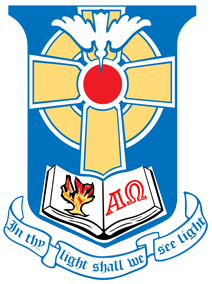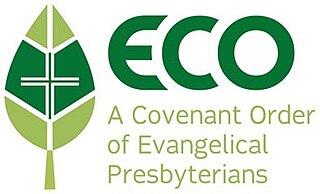
The Presbyterian Church (USA), abbreviated PC (USA), is a mainline Protestant denomination in the United States. It is the largest Presbyterian denomination in the country, known for its liberal stance on doctrine and its ordaining of women and members of the LGBT community as elders and ministers. The Presbyterian Church (USA) was established with the 1983 merger of the Presbyterian Church in the United States, whose churches were located in the Southern and border states, with the United Presbyterian Church in the United States of America, whose congregations could be found in every state.
Presbyterianpolity is a method of church governance typified by the rule of assemblies of presbyters, or elders. Each local church is governed by a body of elected elders usually called the session or consistory, though other terms, such as church board, may apply. Groups of local churches are governed by a higher assembly of elders known as the presbytery or classis; presbyteries can be grouped into a synod, and presbyteries and synods nationwide often join together in a general assembly. Responsibility for conduct of church services is reserved to an ordained minister or pastor known as a teaching elder, or a minister of the word and sacrament.

The Cumberland Presbyterian Church is a Presbyterian denomination spawned by the Second Great Awakening. In 2019, it had 65,087 members and 673 congregations, of which 51 were located outside of the United States. The word Cumberland comes from the Cumberland River valley where the church was founded.

The Presbyterian Church in the United States was a Protestant denomination in the Southern and border states of the United States that existed from 1861 to 1983. That year, it merged with the United Presbyterian Church in the United States of America (UPCUSA) to form the Presbyterian Church (USA).

The Associate Reformed Presbyterian Church (ARPC), as it exists today, is the historical descendant of the Synod of the South, a Synod of the Associate Reformed Church. The original Associate Reformed Church resulted from a merger of the Associate Presbytery and most of the Reformed Presbytery in Philadelphia in 1782. The northern Synods eventually merged with the forebearers of the Presbyterian Church (USA). Because of its 1782 date of origin, it is one of the oldest of the United States' theologically and socially conservative denominations.

The United Presbyterian Church of North America (UPCNA) was an American Presbyterian denomination that existed for one hundred years. It was formed on May 26, 1858 by the union of the Northern branch of the Associate Reformed Presbyterian Church with the Associate Presbyterian Church (Seceders) at a convention at the Old City Hall in Pittsburgh. On May 28, 1958, it merged with the Presbyterian Church in the United States of America (PCUSA) at a conference in Pittsburgh to form the United Presbyterian Church in the United States of America (UPCUSA).

The Bible Presbyterian Church is an American Protestant denomination in the Calvinist tradition.

The Reformed Presbyterian Church General Assembly (RPCGA) is a Presbyterian church body and conservative denomination in the United States established in 1991. The RPCGA was founded by members of the Reformed Presbyterian Church in the United States.
The Reformed Presbyterian Church, Evangelical Synod was a Reformed and Presbyterian denomination in the United States and Canada between 1965 and 1982.

David Steele, Sr. was a Reformed Presbyterian or Covenanter minister.
The Reformed Presbyterian Church - Hanover Presbytery is a very conservative Protestant, Presbyterian denomination, founded in 1991, with congregations in United States and also in Brazil.

Robert Park was an American college football coach. He was the tenth head football coach at Geneva College in Beaver Falls, Pennsylvania, serving for one season, in 1922, and compiling a record of 4–6. He also coached other sports for many years, but he was best known for his work as an academic and a minister of the Reformed Presbyterian Church of North America (RPCNA).

The Stafford Reformed Presbyterian Church, also known as Covenanter Church, is a historic church in Stafford, Kansas, United States. Constructed in 1913, the building is a small-sized example of Gothic Revival architecture. It replaced an older church built on the same site, which was demolished because it had fallen into poor condition. The church itself existed as a part of the Reformed Presbyterian Church of North America (RPCNA) from 1911 to 1961. The building was added to the National Register of Historic Places on June 8, 2005 for its architectural significance. Today, the church is owned by a local company, Henderson House Inn and Retreat Center, which uses it as part of its conference center.

The Reformed Presbyterian Church of North America (RPCNA) is a Presbyterian church with congregations and missions throughout the United States, Canada, Japan, and Chile. Its beliefs—held in common with other members of the Reformed Presbyterian Global Alliance—place it in the conservative wing of the Reformed family of Protestant churches. Below the Bible—which is held as divinely inspired and without error—the church is committed to several "subordinate standards," together considered with its constitution: the Westminster Confession of Faith and Larger and Shorter Catechisms, along with its Testimony, Directory for Church Government, the Book of Discipline, and Directory for Worship.

The Reformed Presbyterian Church of Scotland is a small, Scottish, Presbyterian church denomination. Theologically they are similar to many other Presbyterian denominations in that their office-bearers subscribe to the Westminster Confession of Faith. In practice, they are more theologically conservative than most Scottish Presbyterians and maintain a very traditional form of worship. In 1690, after the Revolution, Alexander Shields joined the Church of Scotland, and was received along with two other ministers. These had previously ministered to a group of dissenters of the United Societies at a time when unlicensed meetings were outlawed. Unlike these ministers, some Presbyterians did not join the reconstituted Church of Scotland. From these roots the Reformed Presbyterian Church of Scotland was formed. It grew until there were congregations in several countries. In 1876 the majority of Reformed Presbyterians, or RPs, joined the Free Church of Scotland, and thus the present-day church, which remained outside this union, is a continuing church. There are currently Scottish RP congregations in Airdrie, Stranraer, Stornoway, Glasgow, and North Edinburgh. Internationally they form part of the Reformed Presbyterian Communion.
Robert Adam Holliday Lusk was a Reformed Presbyterian or Covenanter minister of the strictest sort, in a century which, according to Presbyterian historian Robert E. Thompson, was marked by increasing relaxation into less stringent manifestations of doctrine and practice amongst all branches of Presbyterianism. His career crossed paths with many prominent ministers and he was involved in numerous ecclesiastical courts at pivotal moments in the history of the Reformed Presbyterian Church. Amongst Reformed Presbyterians, he was an "Old Light," and amongst "Old Lights," he would lay claim to be an "Original Covenanter." He was descended from a long line of Scotch-Irish, and the Lusks had fled from Scotland to Ireland, escaping religious persecution; many of them settled in America prior to the American Revolutionary War.

ECO: A Covenant Order of Evangelical Presbyterians is an evangelical Presbyterian denomination in the United States. As a Presbyterian church, ECO adheres to Reformed theology and Presbyterian polity. It was established in 2012 by former congregations and members of the Presbyterian Church (USA), abbreviated PC(USA). Denominational disputes over theology—particularly ordination of practicing homosexuals as pastors and gay marriage—and bureaucracy led to the founding of ECO. In 2018, ECO has over 383 congregations, 103,425 covenant partners and over 500 pastors. ECO churches are egalitarian in beliefs and ordain women as pastors and elders.
The Reformed Presbyterian Church in Taiwan was officially established in 1971 when the First Presbytery was formed as a result of the union of various conservative Presbyterian and Continental Reformed congregations planted by various missionary groups. Its origin could be traced back to the 1950s when the very first missionaries of those Presbyterian and Continental Reformed missionaries arrived in Taiwan.

Presbyterianism has had a presence in the United States since colonial times and has exerted an important influence over broader American religion and culture.
















